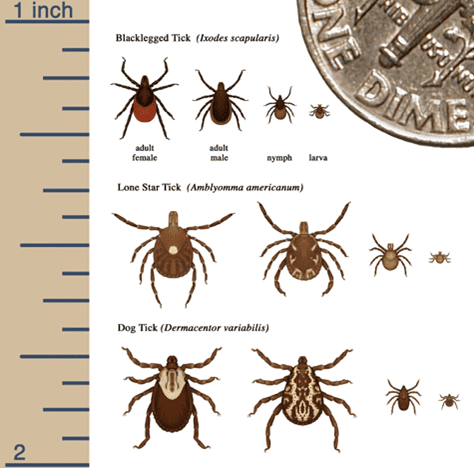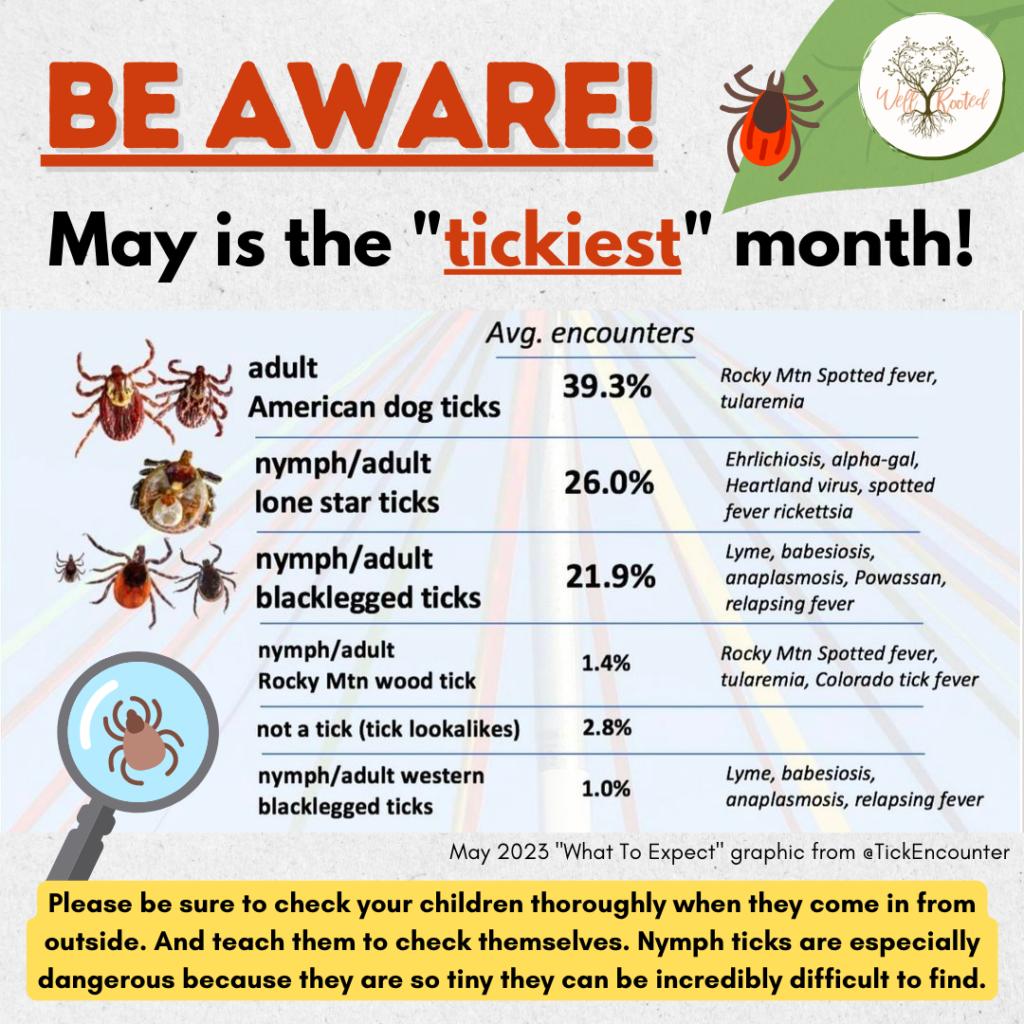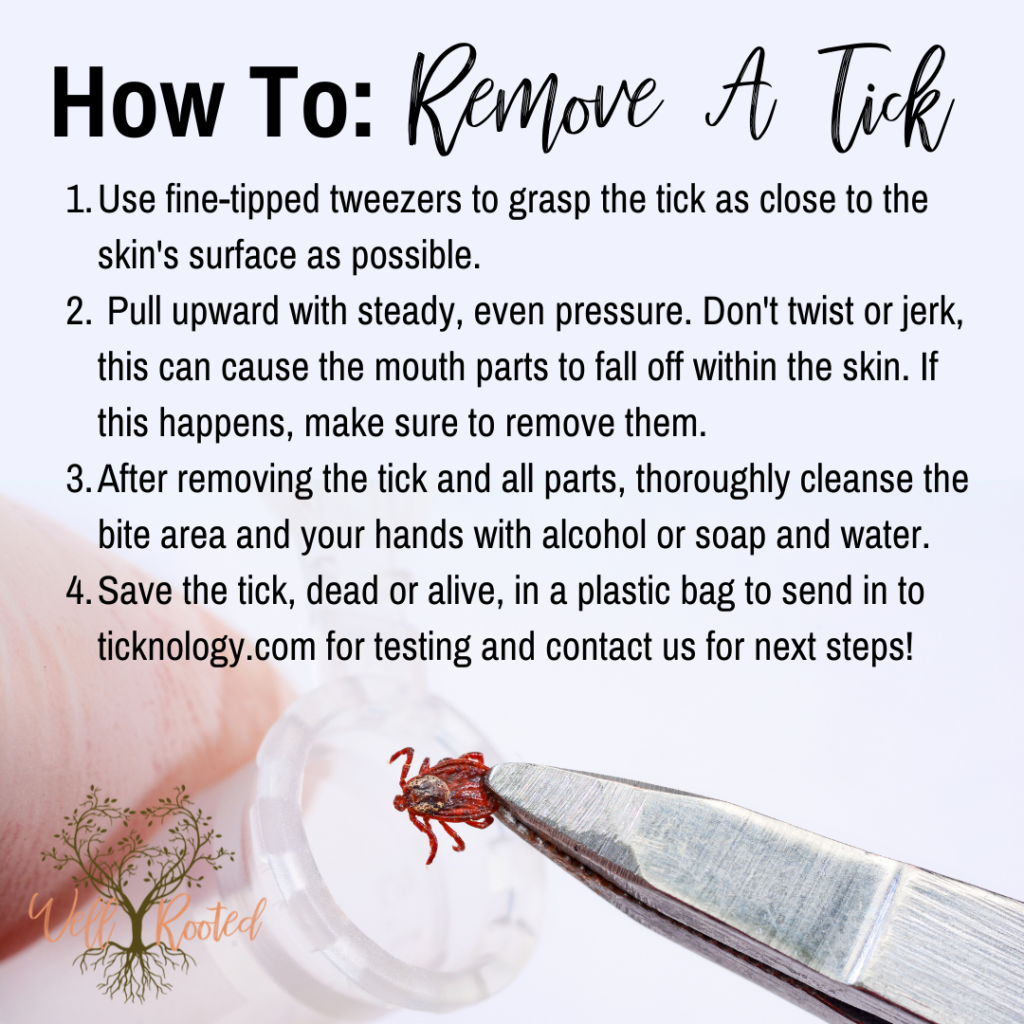It’s “tick” time! 🪳 Be on the lookout! 👀
Believe it or not, tick season is upon us once again!
🌷 Ticks are very active in the spring, summer, and even into the fall, peaking from March to May.
The 3 most common ticks we have in Illinois are the blacklegged tick (aka deer tick) 🦌, the American dog tick (aka wood tick) 🐕, and the lone star tick ⭐️. The blacklegged tick aka the deer tick is the one that most commonly spreads tick-borne diseases in IL.
🔸 In order to spread disease to a human or animal, a tick needs to be infected with a disease agent and it needs to be attached to the host for a certain amount of time.
If the blacklegged tick is infected, it typically must be attached for 24-48 hours before it transmits Lyme disease, however transmission can occur much sooner.
🔸 On average, about 1 in 3 adult blacklegged ticks and 1 in 5 blacklegged tick nymphs is infected with the bacteria that causes Lyme disease.


▪️ Nymphs can be as small as a POPPYSEED early in the season and can do just as much damage as their full-grown parents. Just because you don’t live in the woods, doesn’t mean you don’t need to be aware! Ticks are everywhere!
🔎 Please be sure to check your children thoroughly when they come in from outside. And teach them to check themselves. Nymph ticks are especially dangerous because they are so tiny they can be incredibly difficult to find.
👖 Change outdoor clothing right away and wash it in hot water. It is recommended to shower immediately and check hair, ears, armpit, and groin areas thoroughly after being outdoors.
📌 IF you do find a tick on yourself or on your loved ones, KEEP YOUR TICK for testing!
📦 You can send ticks, dead or alive, to www.ticknology.org for testing.


Here are detailed instructions on how to remove a tick if it has bitten you or your child. 🔎 Check pets too!
⭕️ If you have had a tick bite, keep an eye out for stage 1 symptoms of Lyme Disease. Following a tick bite, we follow a protocol of supportive natural treatments in our office rather than antibiotics.
Contact us or your healthcare provider if you have concerns over a tick bite.
Early symptoms of Lyme disease usually happen within 3 to 30 days after a tick bite. Some people may not present symptoms in early stages of Lyme infection, however, they may include:
🔸A rash, typically in a “bullseye” pattern around the bite
🔸Fever
🔸Headache
🔸Extreme tiredness
🔸Joint stiffness
🔸Muscle aches and pains
🔸Swollen lymph nodes
If you find a tick that has bitten through the skin, remove it, save it -dead or alive – to send for testing, and contact us to formulate an appropriate treatment plan. ☎️ 815-322-9300
🌿 Fortunately, there ARE some natural ways to help keep ticks at bay without the use of icky chemicals... 🍃
1️⃣ Cedar oil. Cedar oil is a non-toxic, natural tick and insect repellent. Spray directly onto clothes and garments, and apply to skin once properly diluted in a carrier oil like jojoba or almond.
2️⃣ Neem oil. Neem oil is used as a natural remedy to repel and remove ticks. Dilute several drops in jojoba or almond oil and apply to exposed skin.
3️⃣ Eat garlic. Regular consumption of garlic or garlic capsules reduce the risk of tick bites. The garlic causes the body to excrete a scent that ticks hate.
4️⃣ Homemade insect spray. Mix ingredients together and apply to exposed skin before going outside.
▪️ 9 drops Citronella essential oil
▪️ 6 drops Tea Tree essential oil
▪️ 6 drops Peppermint essential oils
▪️ 1 tablespoon almond oil or jojoba oil
5️⃣ Apple cider vinegar. Combine the following ingredients in a spray bottle and spray onto skin, clothing, or even lawn furniture:
▪️ 2 cups of water
▪️ 4 tablespoons of apple cider vinegar
▪️ 2 tablespoons of organic neem oil
6️⃣ Eucalyptus Oil. An effective tick repellent and killer. Combine 4 ounces of purified or distilled water to a small spray bottle along with 20 drops of eucalyptus essential oil. Shake before using and spray on skin, pant cuffs, and shoes. Do not spray directly onto skin without a carrier oil to dilute.
7️⃣ Certain aromatherapy essential oils. Ticks hate the smell of lemon, orange, cinnamon, lavender, peppermint, and rose geranium. Please use caution, use good quality organic oils, and always dilute with a carrier oil if applying to bare skin.
** This is not medical advice. Please do your own research and exercise caution when using essential oils on yourselves, your children, and around pets. Consult a certified aromatherapist with questions. **
OUR LOCATIONS
Crystal Lake, IL
390 Congress Parkway Suite J, Crystal Lake, IL
Oak Brook, IL
814 Commerce Drive Ste 150 Oak Brook, IL 60523
HOURS OF OPERATION
Crystal Lake, IL
| Monday | 9am to 5pm |
| Tuesday | 9am to 5pm |
| Wednesday | 9am to 5pm |
| Thursday | 9am to 5pm |
| Friday | 9am to 5pm |
| Saturday | 1st, 2nd & 3rd Saturday Of The Month |
Oak Brook, IL
| Monday | 9am to 5pm |
| Tuesday | 9am to 5pm |
| Wednesday | 9am to 5pm |
| Thursday | 9am to 5pm |
| Friday | 9am to 5pm |
| Saturday | Closed |
Crystal Lake Office
390 Congress Parkway Suite J
Crystal Lake, IL
Phone 815-322-9300
Fax 815-322-9315
Email [email protected]
Oak Brook Office
814 Commerce Drive Ste 150
Oak Brook, IL 60523
Phone 815-322-9300
Fax 815-322-9315
Email [email protected]
Office Hours
Monday: 9am to 5pm
Tuesday: 9am to 5pm
Wednesday: 9am to 5pm
Thursday: 9am to 5pm
Friday: 9am to 5pm
Saturday: Varies By Location

